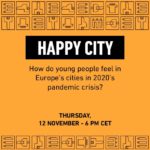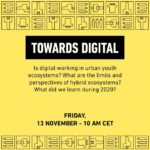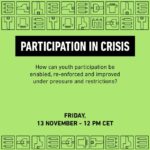The coronavirus pandemic is spreading fast, which calls for rapid, concerted and consistent reactions from all sides. We are witnessing the unprecedented closing of the borders that were never expected to be closed again and demands to stay home as the most powerful sign of citizens’ solidarity.
In February 2020, Tim Bradshaw, a technology correspondent for the Financial Times wrote ‘ (…) for Silicon Valley’s evangelists, remote working is more than just a stopgap in a crisis — it is an improvement on office life. If the coronavirus continues to spread, many more of us may have the chance to find out for ourselves which it really is’. A few weeks later almost the whole Baltic Sea Region, as did other parts of the world, had to go into the ‘online’ mode and most of the international/ transnational/cross-border projects have since been run from home-offices.
For the European Union Strategy for the Baltic Sea Region, it is a challenging time, as well. Its Annual Forum has just been postponed from mid of June to 19-20th October 2020 and most of the other events are being cancelled or moved to later dates. For the time being, the prospects are that the Autumn will be packed with face-to-face conferences and meetings.
With the restrictions in moving across countries and the situation when thousands of citizens have serious problems with coming back home from abroad, ministries of foreign affairs work full-hand (also partially remotely) so the process of the revision of the EUSBSR’s Action Plan became more difficult for the time being. ‘There are no physical meetings of National Coordinators’ group planned at the moment’, confirms Joanna Wojtkowska, EUSBSR National Coordinator from Poland and adds that the work will be carried out in a written procedure for now.
The new reality is also a challenge for international organizations working in the Baltic Sea Region. Anna Sośnicka, from the Secretariat of the Union of Baltic Cities, which is the leading network of cities in the Baltic Sea Region with Member Cities from Denmark, Estonia, Finland, Germany, Latvia, Lithuania, Norway, Poland, Russia and Sweden says ‘UBC planned to have a UBC Executive Board meeting in Liepāja, Latvia on 17 April 2020, but due to all those restrictions it has been cancelled and an online meeting will be held at the same time instead. Two other meetings of the UBC Commissions to be held in April and May are postponed; new dates are not settled yet. The Commissions limit their activities concerning project implementation. They have only online activities – emails, teleconferences’. The situation across the Baltic Region is very similar, with some exceptions. Magda Leszczyna- Rzucidło, the head of International Permanent Secretariat of Euroregion Baltic says: ‘In Euroregion Baltic, we have now entered the home-office mode mostly. Since our International Permanent Secretariat is based in Poland, we work from home now, and our offices are closed. From all ERB Partners, only Sweden is still regularly working from their offices, the rest of the ERB Secretariats from Poland, Denmark, Lithuania and Russia are all experiencing lockdown.’
The consequences of COVID-19 for the cooperation within EUSBSR and the Baltic Sea Region as a whole, are difficult to predict. Many measures have been taken to ease certain problems. Many solutions are yet to be found. And we must be aware that some problems just can’t be avoided and we will just need to face in their full scope and strength. An important issue is raised by Magda Leszczyna-Rzucidło: ‘Since we had worked a lot using online tools before, it was not a problem for us to switch to Zoom and Wheraby meetings and we use them both for the internal work, but also our projects. i.e. Interreg South Baltic Project Umbrella, where ERB acts as a Lead Partner. The biggest problem we face now is the number of physical meetings cancelled or postponed. Due to the uncertain situation, we are not able to tell whether they could happen still in Spring/early Summer, or we should postpone to fall, which may be very busy then’.
On the other hand, much of the Baltic Sea cooperation can be very successfully carried out using the available technology, without the necessity of physical interactions. In fact, a lot of the work carried within EUSBSR has already been done online for years. Projects, flagships and platforms have got used to Internet tools, virtual meetings and data sharing. The current situation can, therefore, give an additional incentive to scale-up and upgrade the technological skills for the benefit of ongoing operations. ‘As many people in Europe, for the time being, we are awaiting further developments more than actively doing ’corona-business’, says Anja Uhlenbrok, who is EUSBSR’s Priority Area Culture Co-Coordinator from Schleswig-Holstein. ‘With regards to the cooperation with our flagships, no change has yet shown up. We presume that they are available through the usual channels and go on in their work as usual’.
Apart from communication between the partners, also the events themselves can go online. Krystyna Wróblewska, the Secretary-General of the Baltic Sea States Subregional Cooperation (a network of the Baltic regions) says that, upon the agreement with the BSSSC Youth Coordinator, the organization is now moving the BSSSC Spring Youth Event planned for Gdańsk in April to the virtual space. She claims that it will change not only the method of communication but also make its thematic scope more suitable for the current situation. ‘Let’s be honest– Mrs Wróblewska notices –how to talk about the circular economy now when millions of disposable plastic gloves, etc need to be used’. We have to address the new situation not forgetting the ambitious green goals”
Another example comes from UrbCultural Planning, a EUSBSR flagship project in the area of Culture (https://urbcultural.eu/about/). Partners are discussing to what extent it is feasible to go virtual when dealing with social change while using cultural planning methods. One of the issues is to what extent the project activities can be carried out as planned with some postponements and how much partners should focus on the new situation and use other – virtual tools. Anyway, the project is about making cities and neighbourhoods better places to live.
As Anja Uhlenbrok notices ‘Changing our working routines is probably the most emerging tasks for the time being: most people involved in the implementation of the PA are working in the home office now, many also taking care of small children. To ensure the usual cooperation in day-to-day business is the biggest challenge so far.’ So- yes, current remote working on a full Baltic scale is a challenge. But it is also an opportunity. And a great chance for creativity. Now, it depends on our institutions, our companies, and to a great extent on us- if we take a ‘Silicon Valley evangelists’ stand and ‘re-programme’ ourselves, opening for possible innovations. Certainly, they can benefit the EUSBSR and the whole Baltic Sea Region cooperation. Yet, we are maybe even more aware now that not everything can and should be moved to virtual reality –that direct human relations are really important.
Author: Marta Czarnecka-Gallas, Association “Pomorskie in the EU”



